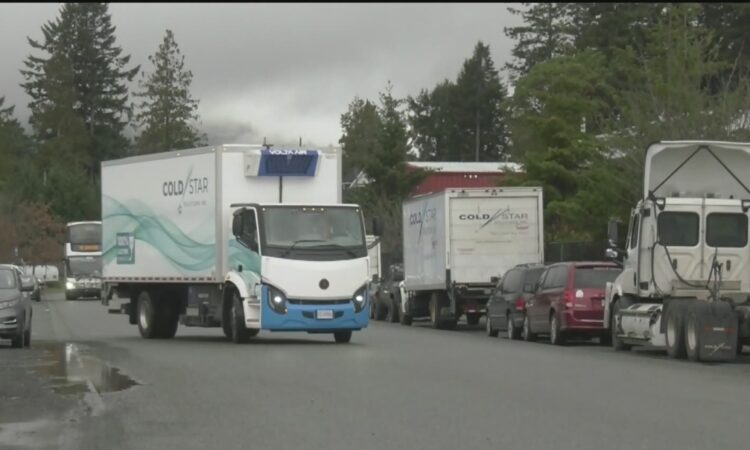A Langford, B.C., transport company specializing in hauling food believes the newest addition to its fleet is a national first in electric vehicle technology.
“We’re the first ones in Canada to do an electric, refrigerated truck,” said Coldstar Solutions Inc. CEO Kelly Hawes.
To date, Coldstar’s main focus for commercial green vehicles has been under its compressed natural gas vehicle program. It has 25 of them in its fleet, along with nine diesel trucks.
Then, while seeking options to expand during the COVID-19 pandemic, it faced significant supply chain issues – which eventually led Hawes to partner with two Canadian companies for an innovative solution to obtain the EV truck.
“It’s kind of a fun project of mine,” said Hawes. “It’s taken a little over a year to put together.”
Coldstar Solutions worked with a heavy-duty truck manufacturing company, Lion Electric, in Montreal to build the vehicle.
At the same time, Richmond, B.C.’s Volta Air built an electric reefer so Coldstar could introduce the refrigerated component. A special cargo box was also built with lighter and more insulated features.
The hauling truck went into service on June 1, 2022 – and driver Shane Maxwell says it’s a conversation piece on the road.
“Everywhere we go, people want to come out and talk about it,” said the Coldstar employee of 10 years.
Canadian policy advisors say more vehicles like it are needed nationally.
“If Canada wants to reach its emissions targets and emissions goals, electrifying transportation will be a key part of that,” said Ekta Bibra with Clean Energy Canada.
“In particular, these trucks and buses take up almost 10 per cent, at least, of our emissions nationally. So the emissions savings are really important because there’s no emissions that come from the tailpipe of these vehicles,” said Bibra.
CONVERSION COSTS
The upfront cost for Coldstar to introduce its EV truck has been significant – three times the prices of a diesel version at $477,000.
The company received a $100,000 grant from the province of B.C., but didn’t qualify for one at the federal level. It also spent $77,000 on the required infrastructure for a charging station.
“This truck running five days a week, servicing the Victoria area, has cost us $354 in all of that time in hydro, which equals about just under six cents a kilometre,” said Hawes. “A diesel truck doing the exact same route was costing us $134 a day.”
Coldstar anticipates it’ll take six years for the truck to pay for itself. It would like to expand, potentially adding as many as two more within the next year, but the company stops short of calling for a full switch just yet.
“Whether there’s a business model for this particular truck at this price, I’m not sure we’re there yet,” said Hawes.


